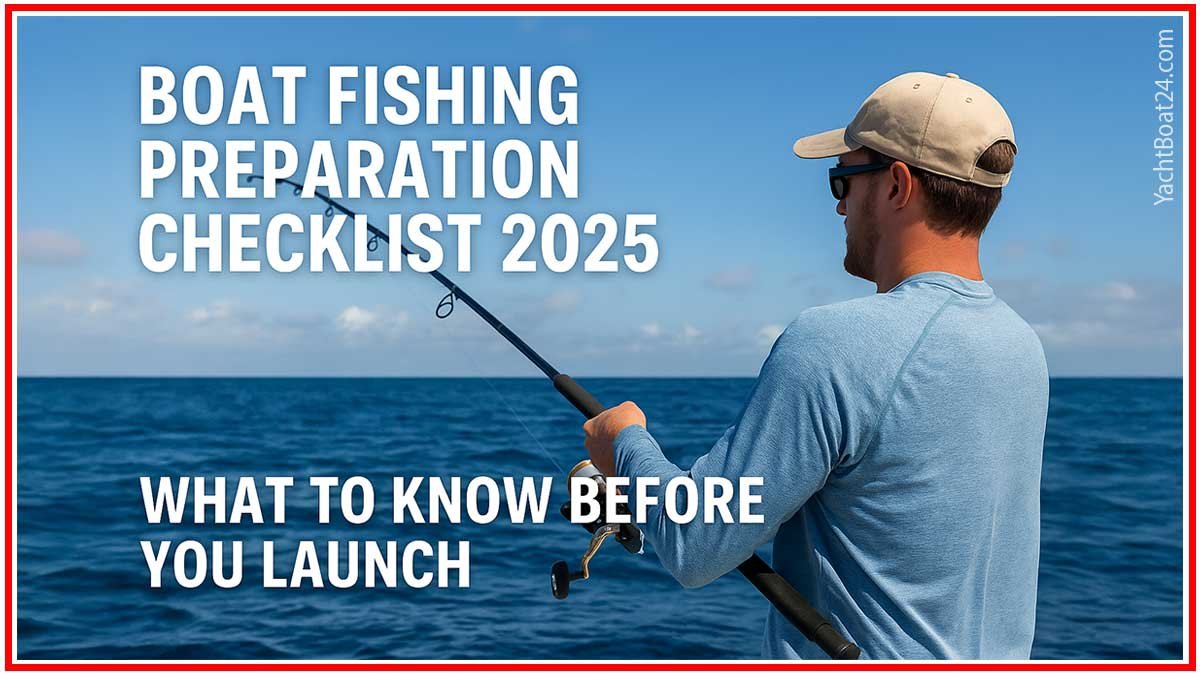Table of Contents
Introduction – More Than a Rod and a Boat
Boat fishing preparation, casting off from the dock, you think only of the thrill ahead—but the truth is that fishing from a boat is an orchestration of safety, knowledge, and strategy. In 2025, experienced anglers know that proper fishing boat preparation not only enhances the catch, but safeguards everyone aboard. From weather forecasting to gear readiness, the art of preparation turns an ordinary outing into a memorable—and safe—sea-bound adventure.
Safety First – Emergency Readiness and Equipment
Every seasoned skipper understands that safety is the non-negotiable first step. Life jackets must fit each crew member snugly and remain accessible at all times. VHF radios and emergency beacons like PLBs or EPIRBs should be tested before departure. Visual signals such as flares or signal mirrors must not only be present but within expiration dates and stored in dry, visible cases.
Monitoring weather isn’t just routine—it’s mission-critical. A sudden squall can turn calm water into choppy chaos within minutes. Checking reliable forecasts and interpreting barometric trends means your boat fishing preparation includes weather sense, not just convenience.
Boat Readiness – Mechanics, Fuel, Navigation Gear
Your vessel is your platform—but it must be in top shape. Inspect fuel levels, ensure clean filters, and test throttle and steering responsiveness. Battery health and charging systems cannot be ignored, particularly for longer days on the water when sonar and GPS are working hard.
Fish finders, depth sounders, and GPS units deserve pre-launch diagnostics. Do they power on reliably? Is the transducer clean and properly mounted under the hull? Even a faint sonar reading can mislead you into shallow waters, so proper calibration is essential.
Hull-specific checks—including propeller integrity and bilge pump functionality—are vital. You also want your anchor and line tested and ready before reach. This level of scrutiny in boat fishing preparation ensures your boat is a partner, not a liability.
Fishing Gear Strategy – Matching Tackle to Targets
A successful day of fishing begins long before your hook hits the water. Your boat fishing preparation should include careful consideration of your target species. Are you chasing pelagic predators like tuna or mahi-mahi? Or perhaps you’re hunting reef fish, bass, or red drum? Each requires specific tackle—rod strength, reel ratio, line weight, and even hook shape.
In 2025, tech-enhanced gear is becoming standard. Smart lures with vibration sensors and depth-adjusting sinkers can significantly boost your success rates. But high-tech doesn’t replace strategy. You must understand bait types, water temperature, and depth where your targets are likely to be found.
Don’t forget onboard organization. Tackle boxes must be waterproof and clearly labeled. A proper bait station with a knife, gloves, and cleaning surface prevents mess and confusion. Cooler placement also matters—easy to reach, yet secured for bumpy waters.
Weather and Tides – Mastering the Maritime Clock
No element affects fishing success more than tides, wind, and sunlight. Using marine apps like Windy or Fishbrain, you can analyze tidal phases, water temperature trends, and feeding windows. But always compare multiple forecasts—especially when fishing offshore.
Wind not only determines drift patterns but influences safety. A 10-knot headwind might feel mild onshore but could create hazardous chop miles out. Your boat fishing preparation must also include planning your departure time to coincide with rising tides and favorable currents.
Tidal shifts also expose hazards like shallow bars or submerged rocks. A good fisherman doesn’t fight nature—they ride it.
Fishing Licenses and Local Regulations
Fishing without proper licensing is a mistake that can cost far more than a fine—it can end your trip abruptly. Every boat fishing preparation must start with checking your regional and national fishing laws.
Licensing
- Most coastal nations require either a recreational fishing license or a saltwater fishing permit, often tied to vessel registration.
- Apps like Fish Rules or iAngler provide up-to-date licensing info and catch limits based on location.
Seasonal and Species Restrictions
Some fish, like snook, red snapper, or certain tunas, are regulated by season, size, and gear type. Others, like protected groupers or reef dwellers, may require immediate release.
International waters present another challenge. In places like the Caribbean or Mediterranean, you might need clearance from local ports or a charter endorsement. Always prepare copies of your licenses digitally and physically aboard.
Ignoring these rules isn’t just illegal—it disrupts marine ecosystems and can trigger heavy penalties.
Crew Coordination and Catch Management
Every great fishing trip is a team effort. Assign crew roles before departure: helm control, net duty, bait prep, anchor management. Create a simple checklist shared via group chat or printed and laminated on deck.
When it comes to the catch, speed matters. Fish should be stored in ice immediately to preserve quality. Bleeding certain species (like tuna) improves taste, while others may be tagged for research or tournaments. Have gloves, knives, cutting boards, and plastic bags ready before the first line is dropped.
Respect catch limits. It’s not just the law—it’s good sportsmanship.
Final Thoughts
Preparation is more than packing a rod—it’s about setting yourself up for safe success. In 2025, smart boat fishing preparation means blending modern tools with time-tested seamanship. Whether you’re out for fun, food, or a new personal best, a well-prepared trip is always the most rewarding.
Video – Boat Fishing Preparation
FAQ – Boat Fishing Preparation
This website offers general information for your convenience. YachtBoat24.com makes no warranties, either express or implied, and all use of this site is at your own risk. We are not responsible for third-party content linked to or from this site.

